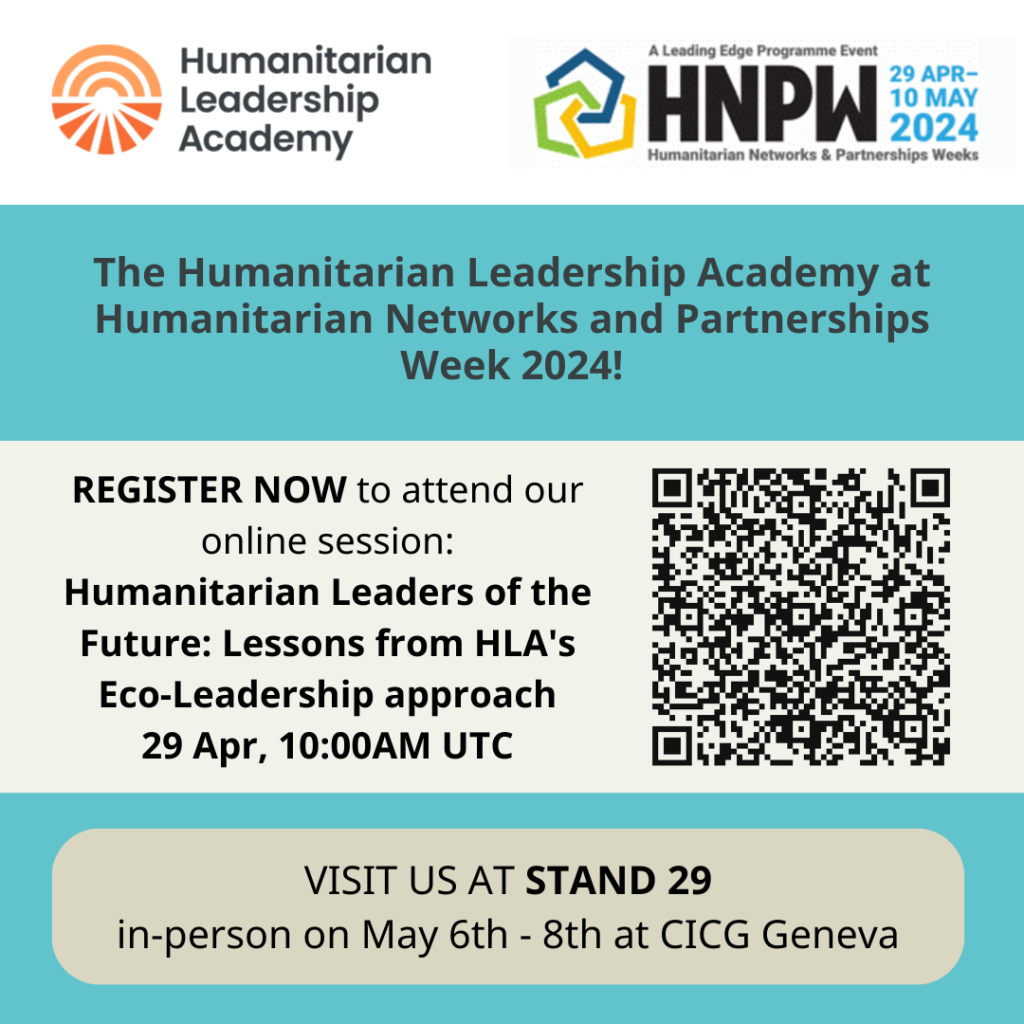29th April 2024

HLA at the Humanitarian Networks and Partnerships Weeks (HNPW)
As global crises continue to happen – in many cases sporadically due to the climate crisis, the Humanitarian Leadership Academy leaning on our experience of supporting over 750,000 humanitarians globally examined the changing nature of global crises, the current humanitarian landscape and why radical new thinking is important.
At HNPW, we shared lessons from our regional training strategy and our coaching and mentoring platform to explore – how we can get better youth engagement, what new funding models and localised responses are required, and why the next generation of humanitarian leaders can make a difference.
Join our panel discussion focused on Eco-Leadership, our regional approach to training, coaching and mentoring and Youth engagement.
The HNPW is a platform for inter-network collaboration in areas of common concern (AOCC) with the aim to improve humanitarian preparedness and response. AOCCs include: Accountability to Affected Populations, Climate Crisis, Inclusion, Localisation and Coordination, Integrating Security Risk Management Across Humanitarian Action, Anticipatory Action, Organisational Culture and Power Relations, Nexus Environment, Emergency Response in a Pandemic. The weeks take place from 29th April to 5th May online and 6th to 10th May in person at the International Conference Centre Geneva (CICG) in Geneva.
The session took place 29 April | Online | 10:00am UTC
Speakers
Gugu Xaba, CEO, Save the Children South Africa
Thomas Lay, Regional Humanitarian Director, Save the Children in East and Southern Africa
Charlotte Balfour-Poole, Head of Coaching, Humanitarian Leadership Academy
Deb Barry, Head of Learning & Capability (mat cover), Humanitarian Leadership Academy
Summary of the Humanitarian Leaders of the Future: Lessons from HLA’s Eco-Leadership approach session
At the beginning of the session, Thomas Lay, Regional Humanitarian Director at Save the Children International in East & South Africa, referred to the opening speeches of the HNPW, highlighting the importance of listening to local leaders and communities as well as being more proactive rather than reactive in humanitarian work. Thomas mentioned how this directly correlates with the topic of the session and the Eco-Leadership approach.
From the perspective of coaching & mentoring work, Charlotte Balfour-Poole, Head of Coaching at the HLA, emphasised how the safe space created during coaching and mentoring fosters engagement within communities providing the opportunity to listen and to be heard, creates the space to exchange of thoughts to find the solutions.
“We need to change the way we think as leaders”, said Gugu Xaba, CEO of Save the Children South Africa, highlighting the importance of being more open-minded and ready to hear from local communities, to identify the changes we want to see, and to find the ways of driving these changes together as local and international partners. Gugu also talked about integrated development planning, which helps to raise resilient young leaders who can question the current status quo, be prepared and proactive.
Deb Barry, Interim Head of Learning & Capability at the HLA, shared the perspective of youth participation in localisation, pointing out that not only are young people at the forefront of emergency responses, but they are also the ones who push for the changes in policies for positive changes in their communities. Deb mentioned that young people strive to have a real voice and to strengthen their capacity to be able to make a real impact.
Speaking about how the Eco-Leadership approach can help to navigate current power imbalances, Charlotte stressed that it fosters intergenerational connectivity, mutual trust and respect, which result in the sharing of power and joining efforts to achieve positive results. Gugu made a point of starting with leaders understanding themselves better.
Continuing the topic, Thomas offered to discuss ego as a challenge to balanced leadership. Deb proposed self-reflection as a valuable tool for more experienced leaders to be better support for the younger generation, as admitting failures and sharing experiences is crucial to learning and developing. Both Deb and Gugu made a point about ending the culture of competing and trying to “be number 1” as it only promotes disintegration and division within the sector and communities. “Let’s change the culture from ‘being the best in what I am doing’ to ‘doing the best for the people I support”, – said Deb Barry, Interim Head of Learning & Capability at the HLA.
Sharing about the practical ways to achieve these changes in approach and create a sustainable eco-system, Charlotte shared about the Core Coaching Skills programme which is about to start in Türkiye and Syria to support local leaders. Deb gave an example of using simulations in training for local leaders and how it can change the view on cooperation, sharing power, inclusion, and other aspects of organising a humanitarian response. Gugu highlighted the importance of creating and regularly reviewing stakeholder maps and establishing close relationships with them.
The session was illustrated with live drawings by Austen Shand, Digital Learning Specialist at the HLA. Download the live drawings here.
Watch the session on our YouTube channel
If you attended the session, please leave any feedback and consent to be contacted here.
The HLA thanks HNPW organisers and the Humanitarian 2 Humanitarian (H2H) Network for providing this space to share learnings with fellow humanitarians.